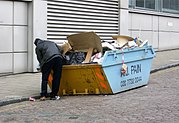Freeganism
From Wikipedia, the free encyclopedia
Freeganism is an anti-consumerist lifestyle whereby people employ alternative living strategies based on "limited participation in the conventional economy and minimal consumption of resources". Freegans "embrace community, generosity, social concern, freedom, cooperation, and sharing in opposition to a society based on materialism, moral apathy, competition, conformity, and greed."[1] The lifestyle involves salvaging discarded, unspoiled food from supermarket dumpsters, known as dumpster diving. The foods may have passed their display date, but haven't passed their edible date. Freegans salvage the food as a political statement, rather than out of need.[2][3]
The word "freegan" is a portmanteau of "free" and "vegan".[4] Freeganism started in the mid 1990s, out of the antiglobalization and environmentalist movements. Groups such as Food Not Bombs served free vegetarian and vegan food that was salvaged from food market trash by dumpster diving. The movement also has elements of Diggers, an anarchist street theater group based in Haight-Ashbury in San Francisco in the 1960s, that gave away rescued food.[4]
Contents |
[edit] Practices
[edit] "Why Freegan" pamphlet
Even the manifesto pamphlet "Why Freegan" (written by Against Me! drummer Warren Oakes in 1999) is unclear in its definition of what constitutes freeganism. At one point, it defines freeganism as "an anti-consumeristic ethic about eating" but goes on to describe practices including dumpster diving, plate scraping, wild foraging, gardening, shoplifting, employee scams, and barter as alternatives to paying for food. Motivations are varied and numerous; some adhere to freeganism for environmental reasons, some for religious reasons and others embrace the philosophy as a form of political consciousness. A short documentary film, Bin Appetit, gives reasons why people become freegans.
The pamphlet does include a lengthy section on non-food related practices, including solar energy, conserving water, carelessness, precycling and reusing goods. Some freegans consider these non-food practices to be components of freeganism itself; others simply consider them to be complementary practices.
[edit] Foraging
Many freegans get free food by pulling it out of the trash, a practice commonly nicknamed dumpster diving in North America and skipping or bin diving in the UK, as well as bin raiding. Freegans find food in the garbage of restaurants, grocery stores, and other food related industries, which they claim allows them to avoid spending money on products that exploit the world's resources, contribute to urban sprawl, treat workers unfairly, or disregard animal rights. By foraging, they believe they are keeping perfectly edible food from adding to landfill clutter and that can feed people and animals who might otherwise go hungry.[2]
Dumpster diving is not, however, limited to rummaging for food. Many divers search for anything that can be recycled or reused, from accessories to power tools in need of small repairs. Some divers collect aluminum cans, which they can then sell for a small profit. And though their name suggests much more of a physical aspect of this process, divers usually do not actually get into dumpsters. Often, these people have all sorts of equipment such as some sort of longer pole that they use to move items already in the dumpster around.[5][6]
[edit] Wild foraging and urban gardens
Instead of buying industrially grown foods, wild foragers[7] find and harvest food and medicinal plants growing in their own communities. Some freegans participate in "guerrilla" or "community" gardens, with the stated aim of rebuilding community and reclaiming the capacity to grow one's own food. In order to fertilize those guerrilla gardens, food obtained from dumpster diving[8] is sometimes also reused. In many urban guerrilla gardens, vermiculture is used instead of ordinary composting techniques in order to keep the required infrastructure/room small.[9][10] Guerrilla gardeners claim to seek an alternative to dependence and participation in what they perceive as an exploitative and ecologically destructive system of global, industrialized corporate food production.
[edit] Sharing
| 3R Concepts |
|---|
Sharing is also a common freegan practice. Food Not Bombs recovers food that would otherwise go to waste to serve warm meals on the street to anyone who wants them. The group promotes an ethic of sharing and community, while working to show what they consider to be the injustice of a society in which they claim fighting wars is considered a higher priority than feeding the hungry.
Really, Really Free Markets are free social events in which freegans can share goods instead of discarding them, share skills, give presents and eat food. A free store is a temporary market where people exchange goods and services outside of a money-based economy.
Freegans also advocate sharing travel resources. Internet-based ridesharing reduces but does not eliminate use of cars and all the related resources needed to maintain and operate them.
Community Bike Programs and Bike Collectives facilitate community sharing of bicycles, restore found and broken bikes, and teach people how to do their own bike repairs. In the process they build a culture of skill and resource sharing, reuse wasted bikes and bike parts, and create greater access to environmentally friendly transportation.
[edit] Relationship to veganism
Freegans believe that even if a product is vegan, it does not guarantee that:[citation needed]
- Workers were not exploited in the product's production;
- Pesticides were not used in its growing;
- Non-renewable and radioactive resources (such as petroleum, coal, and nuclear power) were not used in production, energy use and shipping;
- Rainforest was not cleared to generate plantation land;
- Wildlife was not harmed in production;
- Wasteful packaging was not used.
Freegans claim that people sincerely committed to living the "cruelty-free" lifestyle espoused by vegans must strive to abstain not only from eating, wearing, and using animal skins, secretions (e.g. milk and its by-products), flesh, and animal-tested products, but must attempt to remove themselves from participation in the capitalist economy altogether as workers and consumers.
Some freegans, sometimes called "meagans", consume meat and other animal products only if those animal products would otherwise be wasted.
[edit] See also
- Simple living
- Guerrilla gardening
- Dumpster diving
- Permaculture
- Tax resistance
- List of subsistence techniques
- Regiving
- Homeless
[edit] Footnotes
- ^ "What is a freegan?". Freegan.info. http://www.freegan.info. Retrieved on 2007-06-19. "Freegans are people who employ alternative strategies for living based on limited participation in the conventional economy and minimal consumption of resources. Freegans embrace community, generosity, social concern, freedom, cooperation, and sharing in opposition to a society based on materialism, moral apathy, competition, conformity, and greed."
- ^ a b Carlson, Tucker (February 3, 2006). "'Freegans' choose to eat garbage". MSNBC. http://www.msnbc.msn.com/id/11154276/. Retrieved on 2007-06-21. "These people don‘t eat out of dumpsters because they‘re poor and desperate. They do it to prove a political point. You wouldn‘t expect someone to choose a lifestyle that involved eating out of dumpsters. Kind of seems like something you do as a desperate last resort. But there‘s an entire society of people who willingly get their meals out of the garbage. They‘re called freegans, and they say they have a reason for doing it."
- ^ "Free Lunch. Freegans prove there is such a thing as they dumpster-dive for food for themselves and the homeless.". Houston Press. http://www.houstonpress.com/2004-11-25/news/free-lunch/. Retrieved on 2007-06-21. "Patrick Lyons stands in the middle of a dumpster, staring at a can of meat. "I don't know who eats this stuff," he says. He chucks the can aside and keeps on digging. His ball cap is slung low over his face; it connects to his long, thick, brown sideburns."
- ^ a b "Not Buying It". New York Times. June 21, 2007. http://www.nytimes.com/2007/06/21/garden/21freegan.html. Retrieved on 2007-06-21. "A few of those present had stumbled onto the scene by chance (including a janitor from a nearby homeless center, who made off with a working iPod and a tube of body cream), but most were there by design, in response to a posting on the Web site freegan.info. The site, which provides information and listings for the small but growing subculture of anticonsumerists who call themselves freegans — the term derives from vegans, the vegetarians who forsake all animal products, as many freegans also do — is the closest thing their movement has to an official voice."
- ^ Brace, Alison (March 02), ""Freeloading"", Times Educational Supplement: 28-29, http://search.ebscohost.com/login.aspx?direct=true&db=aph&AN=24420837&site=ehost-live
- ^ Willhite, Nikki (2009). "Dumpster Diving". All Things Frugal. http://www.allthingsfrugal.com/dumpster.htm. Retrieved on Mar 02 2009.
- ^ Institute for the Study of Edible Wild Plants and Other Foragables. Wild Foraging Definition
- ^ Instructables dumpster diving combined with guerrilla gardening
- ^ Journeytoforever small-scale (city) composting information (trough vermiculture)
- ^ Vermiculture combination with city farms in the developing world for the poor
[edit] External links
| Wikimedia Commons has media related to: Freeganism |
- Freegan.info
- Freegan.at Austrian Freegan page (english version)



